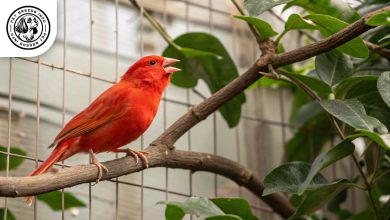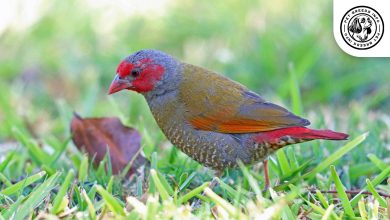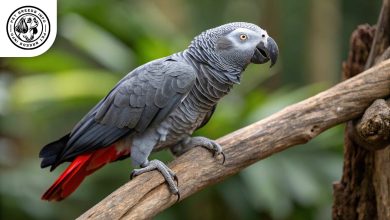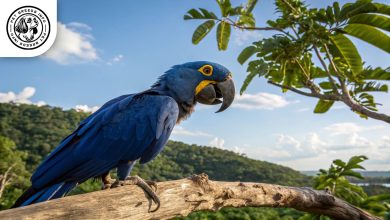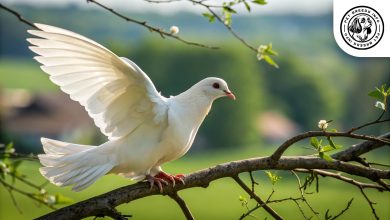American Budgerigar Bird: Personality, Lifespan, Food & Care
General Introduction of the Breed
The American Budgerigar, commonly known as the Budgie or Parakeet, is a small parrot species originating from Australia. The breed was later selectively bred in the United States to develop the American Budgerigar, which differs slightly from its English counterpart in size and appearance. Budgerigars are among the most popular pet birds worldwide due to their intelligence, vibrant colors, and friendly personality.
Table of Contents
| Common Name | Lovebird |
| Scientific Name | Agapornis spp. |
| Origin | Africa (especially Madagascar, mainland regions like Namibia and Tanzania) |
| Size | 5 to 7 inches (13 to 17 cm) |
| Lifespan | 10 to 15 years (up to 20 with excellent care) |
| Colors | Green, peach, yellow, blue, white, and more |
| Talking Ability | Limited (poor word mimicry, but can whistle) |
| Noise Level | Moderate to loud (sharp chirps, can be repetitive) |
| Social Behavior | Very affectionate, bonds strongly with one partner (bird or human) |
Physical Characteristics
The American Budgerigar is smaller than the English Budgerigar, typically measuring around 7 inches (18 cm) in length. It weighs approximately 30-40 grams.
These birds have smooth, sleek plumage and come in a variety of colors, including green, yellow, blue, white, and violet, often with black or white markings on their wings.

They have small, rounded heads with dark or red eyes, depending on the color mutation.
The beak is curved and varies in color based on gender, with males usually having a blue cere (the fleshy area above the beak) and females displaying a brown or white cere.
Their tails are long and tapered, contributing to their elegant appearance.
Read More: American Buff Goose Bird
Personality and Temperament
American Budgerigars are highly intelligent and can learn to mimic words and sounds with proper training.
They are energetic birds that require regular stimulation, such as toys and social interaction.
These birds are social and affectionate towards their owners, often forming strong bonds with their human caregivers.
They are typically comfortable around children and other pets but should be introduced gradually to new environments.
Budgies enjoy interactive playtime and often exhibit playful, inquisitive behavior.
They are sensitive to environmental changes, including sudden loud noises or changes in routine.

Care and Maintenance Requirements
Budgerigars need daily exercise and mental stimulation, which can be achieved with toys, playtime, and flight opportunities within a safe space.
They can thrive in apartments but should have a spacious cage with horizontal bars for climbing.
Grooming is minimal, but regular bathing or misting helps maintain healthy feathers.
They are sensitive to temperature extremes and should be kept in a stable, warm environment.
Hygiene is essential; cages should be cleaned regularly, and their nails trimmed occasionally.
Diet and Nutrition
A balanced diet consists of high-quality seed mixes, fresh vegetables, and occasional fruits.
They require a source of calcium, such as cuttlebones, for beak and bone health.
Foods to avoid include chocolate, caffeine, avocado, onions, and salty or sugary foods.
Portion control is important to prevent obesity, and fresh water should always be available.

Health and Common Medical Issues
Budgerigars are prone to common bird ailments such as respiratory infections, mites, and obesity.
They are also susceptible to fatty liver disease if fed an improper diet.
The average lifespan of an American Budgerigar is around 7-10 years, though some can live up to 15 years with proper care.
Regular veterinary check-ups and vaccinations help ensure a healthy life.
Read More: American Singer Canary Bird
Training and Behavior Management
Budgerigars are relatively easy to train and can learn to mimic speech and perform tricks.
Training should begin at a young age with positive reinforcement techniques.
Consistency and patience are essential for successful training.
Socialization can prevent unwanted behaviors, such as biting or excessive screaming.
Interaction with Other Animals and Humans
American Budgerigars generally get along well with children and enjoy attention.
They can coexist peacefully with other birds but may need gradual introductions.
They are best suited for individuals or families who can provide ample social interaction.
They enjoy companionship but can be independent when provided with stimulating activities.

Price and Availability
The cost of an American Budgerigar ranges from $10 to $50, depending on color mutations and breeder reputability.
It is essential to buy from reputable breeders or adoption centers to ensure a healthy bird.
Potential owners should consider long-term commitment and ongoing care requirements before acquiring a budgie.
Read More: Ancona Chicken Bird
Conclusion and Final Thoughts
The American Budgerigar is an excellent pet choice for both beginners and experienced bird owners.
They thrive in interactive environments where they can receive attention and mental stimulation.
With proper care, diet, and training, these birds can become loving, social companions.
Prospective owners should be aware of their social needs and be ready to provide a fulfilling lifestyle.
FAQ
What is the average lifespan of an American Budgerigar?
The average lifespan is 7-10 years, but with proper care, they can live up to 15 years.
What type of diet does an American Budgerigar need?
They need a balanced diet of high-quality seed mixes, fresh vegetables, occasional fruits, and a calcium source like cuttlebone.
Are American Budgerigars easy to train?
Yes, they are relatively easy to train and can learn to mimic speech and perform tricks with positive reinforcement.
What are some common health issues for American Budgerigars?
They are prone to respiratory infections, mites, obesity, and fatty liver disease.
How much does an American Budgerigar typically cost?
The cost ranges from $10 to $50, depending on color mutations and breeder reputability.

